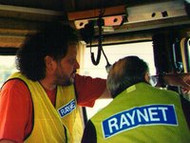The Amateur Radio Service
Posted by Richard G3CWI on 17th Oct 2014
We do amateur radio as a hobby. It's something that we enjoy and of course we have that in common with our fellow hams. We are (hopefully) enthusiastic about our hobby.
Explaining what our hobby is to someone who has never heard of it can be tricky.
The ARRL suggests:
"Amateur Radio (Ham Radio) is a popular hobby and service in which licensed Amateur Radio operators (hams) operate communications equipment."
The RSGB says:
"Amateur radio is a popular technical hobby and volunteer public service that uses designated radio frequencies for non-commercial exchange of messages, wireless experimentation, self-training, and emergency communications."
So we learn that we are participating in a popular hobby that has some element of "service". The idea of the Amateur Service is an important one - although it may not seem so to most of us. It is this definition that gives us access to parts of the radio spectrum under Article 25 of the International Telecommunications Union. This international governmental recognition of us as a Service gives us a credibility that few other hobbies can claim; we're special!
It was once explained to me that governments valued radio amateurs as they were a band of skilled communicators who could be called on in times of crisis. It is certainly the case that radio amateurs made significant contributions during the second World War.
In the US, the idea of service appears to remain at the core of amateur radio. Over here in the UK, perhaps less so. The idea of service does still underpin some of what we do; National Field Day is a good example of a part of the hobby that was originally intended to test our ability to set up temporary radio stations.
Of course the idea of service has not entirely disappeared in the UK. The most obvious vestige being RAYNET. They define themselves thus:
"RAYNET (The Radio Amateurs’ Emergency Network) is the UK’s national voluntary communications service provided for the community by licensed radio amateurs."
As part of my talks to radio clubs I often ask about RAYNET and get some odd looks. unfortunately RAYNET has a bit of an image problem amongst many radio amateurs. It may seem that they lack much relevance in today's interconnected world. At my talks I point out that RAYNET ought to be the most competent portable operators. But perhaps their role is more important than we realise, for it is RAYNET that is the only obvious vestige of a "service" that we can point to. Thus RAYNET is perhaps key to our international credibility as a Service and differentiates us from pure hobbyists.
It's interesting to note that the idea of service is closely connected to our ability and competence in setting up and using portable radio stations. Portable operating is very much "back to our roots" radio. ...a nice thought to bear in mind when you're atop a mountain in winter, trying to make some contacts.
[Thumbnail image from Coventry RAYNET http://homepage.ntlworld.com/vicm0cov/raynet.htm]



